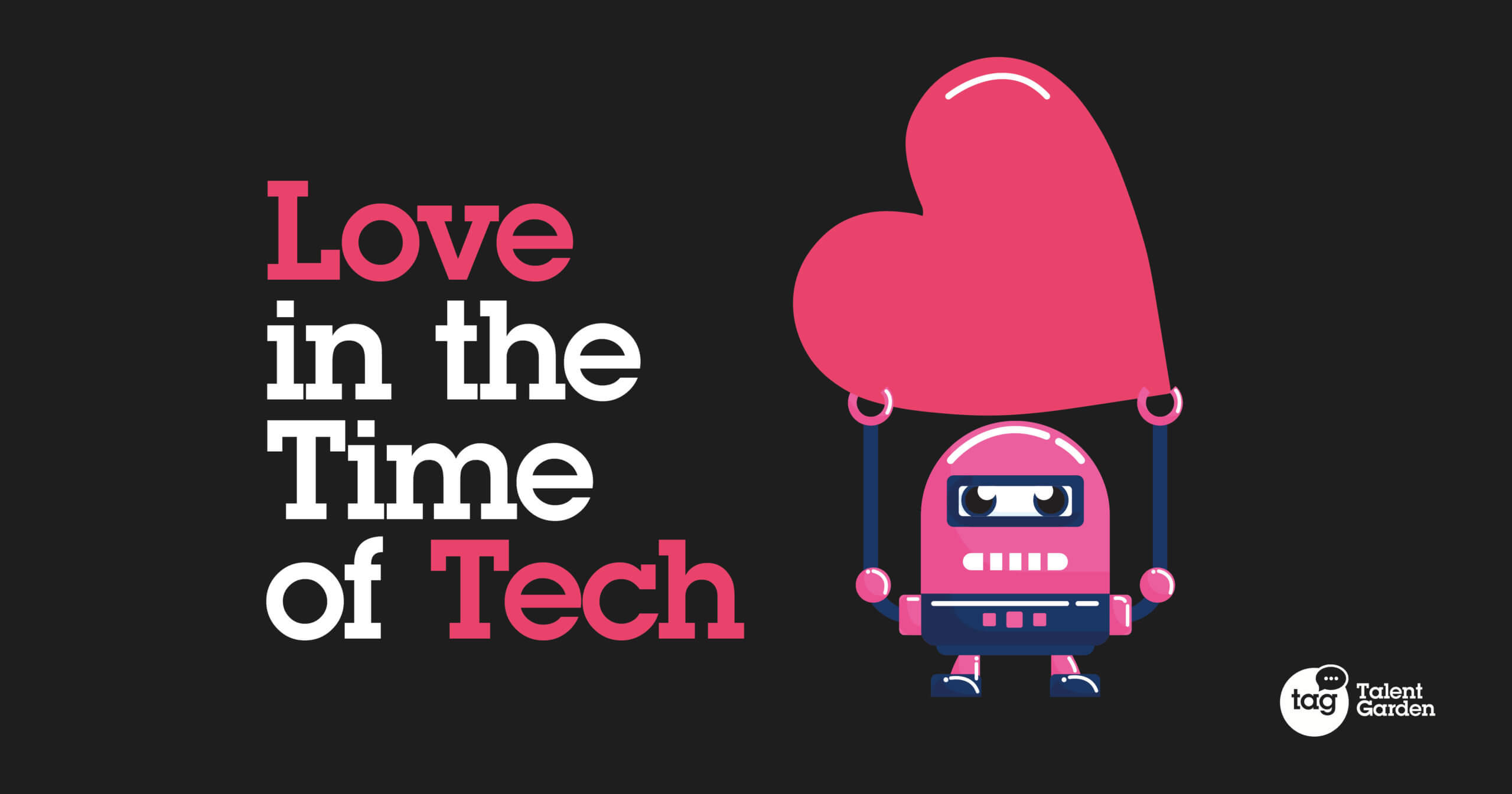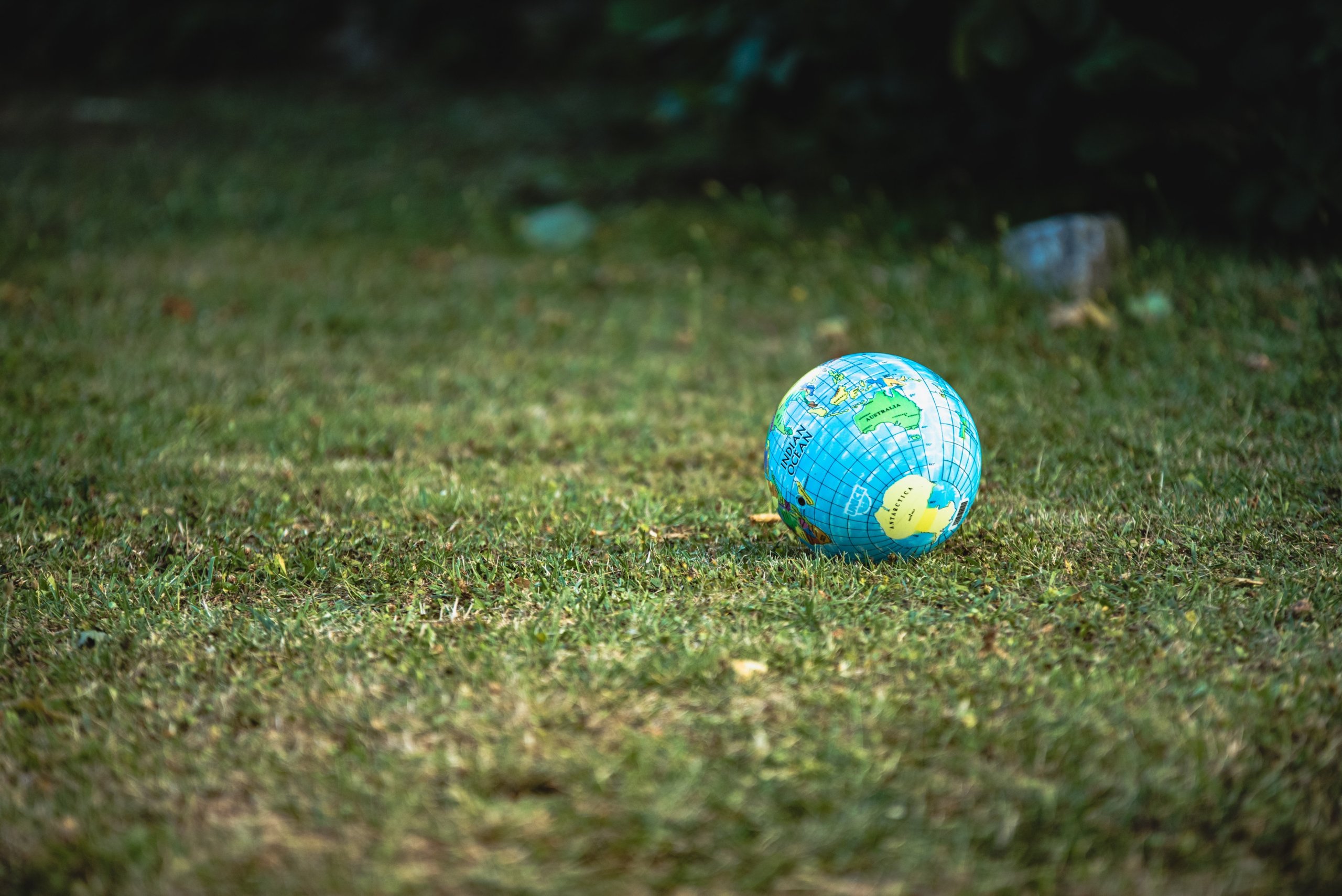- Home
- Business Innovation
- Love in the Time of Tech


Don't you want to read? Try listening to the article in audio mode 🎧
There are only a few aspects of our lives that are untouched by technology and our love lives are no exception.
From the dating phase, when we venture out to find a partner (or various ones); to the inevitable work that comes with keeping a relationship alive or the heartbreak that follows when a love story ends, and the time of self-love needed to mend and become whole again you can be sure a developer out there has come up with a tool to help us through these times.
 In the best of cases, this is precisely what technology does. It looks at our needs - many as old as time - and finds a solution for them. As a tech company, we celebrate this as progress that keeps human needs at the centre and helps in general to improve the quality of life.
Thus, on this Valentine’s Day, we give you a roadmap to technology as a loyal and faithful companion throughout the different phases of your romantic journey.
And since love is blind, but we are not, we also take a look at some of the most common pitfalls in “love tech”, and how to avoid them.
In the best of cases, this is precisely what technology does. It looks at our needs - many as old as time - and finds a solution for them. As a tech company, we celebrate this as progress that keeps human needs at the centre and helps in general to improve the quality of life.
Thus, on this Valentine’s Day, we give you a roadmap to technology as a loyal and faithful companion throughout the different phases of your romantic journey.
And since love is blind, but we are not, we also take a look at some of the most common pitfalls in “love tech”, and how to avoid them.
 In the best of cases, this is precisely what technology does. It looks at our needs - many as old as time - and finds a solution for them. As a tech company, we celebrate this as progress that keeps human needs at the centre and helps in general to improve the quality of life.
Thus, on this Valentine’s Day, we give you a roadmap to technology as a loyal and faithful companion throughout the different phases of your romantic journey.
And since love is blind, but we are not, we also take a look at some of the most common pitfalls in “love tech”, and how to avoid them.
In the best of cases, this is precisely what technology does. It looks at our needs - many as old as time - and finds a solution for them. As a tech company, we celebrate this as progress that keeps human needs at the centre and helps in general to improve the quality of life.
Thus, on this Valentine’s Day, we give you a roadmap to technology as a loyal and faithful companion throughout the different phases of your romantic journey.
And since love is blind, but we are not, we also take a look at some of the most common pitfalls in “love tech”, and how to avoid them.
1 | Finding Love
Dating is probably the first thing that comes to mind when we talk about “love tech”. The need that is behind dating apps is as obvious as it is ancient. Most of us will, at some point, be looking for companionship or at least momentary closeness. Apps like Tinder, Bumble and OK Cupid promise to deliver on both fronts. With many of us stuck in a seemingly eternal ferris wheel of work-commute-sleep, dating apps bring the dating scene from the local bar to our phones. It is easy and, above all, it is convenient. Whereas the main issue for previous generations might have been to find someone to date, we now have an abundance of more or less eligible dates to choose from. Some might even say this is the biggest issue with dating apps; that they convey an image of love as a supermarket of exchangeable goods. Wasn’t it better when our choices were naturally limited? Didn’t we fight more for our relationships before we could just swipe ourselves to the next one in the blink of an eye? Another concern about online dating is that it is unnatural and that it replaces human interaction with (even more) screen time. You could, of course, argue that our entire culture around love is unnatural, in the sense that it is a heteronormative construction that many people do not feel comfortable with. In fact, most of us are very far from the romantic ideals promoted by our culture. Things become even more grey-zone when AI bots like Romantimantic are used to send romantic messages to your loved ones. In this case, technology is actually replacing humans, rather than serving as a tool for them. But how about technological displays of affection, such as virtual hugs and thumb kisses? Some relationship apps, like Couple, claim to be saving long-distance relationships this way. Similarly, an app like Rabbit can be used to watch a film together with your loved one, although they are sitting on a couch far away. Then, there are those who show concern about dating apps because of the darker side of the technology used. For example, a Norwegian study just showed that several popular dating apps, including Tinder, OkCupid and Grindr keep sharing personal data with third parties for advertising purposes, without their user’s consent or knowledge. In fact, Facebook was meant to launch its dating app on Valentine’s Day 2020 but had to postpone it across EU member states after Ireland’s Data Protection Commission raised concerns. Other hazards with dating apps include sexual harassment, violence, a sense of repeated rejection, a twisted body image and more. It is a tough world out there. Online, without the social control of that common friend who set you up, it can be even worse. In fact, disenchantment with lack of real-life chemistry, cancelled dates and dishonest self-promotion are some of the main reasons why many users delete their accounts, only to reinstall them once loneliness kicks in again. Online dating is undoubtedly a place where self-promotion is everything, leading many people to polish the truth to improve their chances. As much as 81% of people lie about their height, age or weight on their profiles. If you want to take it to the next level, you can even find statistics on what makes the best profile and use it to your advantage. As a man, you will discover that being a surfer, talking about kids, watching Homeland, liking cats (but not owning them!), looking forward to retirement, smiling with your teeth, wearing a t-shirt, looking straight into the camera, having great abs, being a Christian, earning a good salary and showcasing solid grammar skills (apparently, using “whom” gets you 31% more dates) will make you particularly hot on the market. Women, on the other hand, you should refer to yourself as a girl, have a flat stomach, love Eternal Sunshine of a Spotless Mind, converse about electronics and do plenty of yoga. What you earn doesn’t really matter and you are free to take as many selfies as you’d like. Just cut the duck-face. Yes, dating apps get their fair share of criticism and often rightly so. They do, however, also do a lot of good for many people, when used in a responsible and well-intended manner. First and foremost, because they actually deliver on what they promise: online dating is today responsible for 2 out of 5 relationships. It also helps us expand away from our usual social networks; it helps us filter dates for common interests easier than we would be able to in a bar, and, for those who travel, dating apps can easily be used in many countries. Another important benefit of online dating is that, although the foundation of many dating apps is still heteronormative, alternatives are now appearing and creating a safe space for other communities. Thurst is a great example of such an app, made by people of colour in the LGBTQ community for queer, cisgender, transgender and non-binary people of colour. New dating apps are also trying to break with the superficiality prevalent in most online dating. An app like Glimmer has been designed to go beyond the looks-centred app dating world and although it is not specifically designed for disabled people, it is inclusive in the sense that it allows you to add a disability to your profile.2 | In a Relationship
Anyone who has been in a long-term relationship knows that it entails a fair amount of project management. Between work events, family visits, dinners with friends and sport activities it can be next to impossible to find time to connect with your partner, and this is without adding kids into the mix. Hence the popularity of family calendars like Raft, which come colour-coded and with plenty of nudging - presumably so you don’t need to do it yourself. Why nag when you can nudge, right? Other popular relationship-management apps are occupied with helping us communicate better. Apps like Love Nudge, which is based on the now famous 5 Love Languages, is designed to help couples understand each other’s needs better while setting goals and tracking your progress. Why ask your partner for attention, when an app can do that for you? Similarly, an app like Lasting, will give you tailor-made tools for your marriage to last. In exchange for extremely sensitive data, of course. Sometimes, internal communication is not enough and you need to look elsewhere for advice. An app like Relationup gives you access to free and professional love advice so you don’t need to spend a fortune on couple’s therapy or exhaust your mother or your friends. Other apps, like Pathshare, take care of more logistic sides of your relationship, such as the exact location of your loved one(s). You can, of course, restrict your partner(s) from seeing your location, but that could lead to some pretty uncomfortable questions. Speaking of practicalities, an app like Honeydue, helps you keep track of your household budget and spendings, and Venmo makes it easier to transfer money to each other, in case you do not have a joint bank account.3 | How Can You Mend a Broken Heart?
Who would not want to carry their best friend around in their pocket for advice and support during a harrowing breakup? Mend might not be a warm-blooded BFF, but it comes pretty close. Through ex-detox, inspirational audio training, advice, guided journaling and more, Mend promises to cure your heartbreak and help you learn from your past. Similarly, RXBreakup helps you get over your heartache and break patterns of toxic relationships through a 30-step program consisting of tailored analytical writing exercises. The power lies within you, but you might need a nudge or two to realize it. For those who need a tough-love approach, there is Break-Up Boss, which is designed to slap your hand away whenever you are about to write your ex by reminding you of all the great things about single life. You can even write a fake text to your ex, in order to vent your emotions without devastating consequences.4 | The Greatest Love of All
So, what now? You have mended your broken heart, been made aware of red flags in your past relationship and feel like you are over the past but not yet ready to take on a new romance. Thankfully, technology is here for you on your path towards the most important love relationship you’ll ever have - the one with yourself. Corny, yes. But also very true. Through gentle nudging, an app like Aloe Bud will help you make good decisions about your life, from drinking water, to keeping in touch with your friends or simply taking the time to breathe in and out. The app also encourages you to love and celebrate yourself. Other great self-care apps are Headspace or Calm, which focus on reducing your anxiety and helping you reach inner peace; Schleep, which helps you get better sleep and Lumosity, which help you get smarter every day through gamified cognitive puzzles. For those who are battling bad habits, there are apps like Loosid to help you drop the booze and SmokeFree to kick your nicotine addiction for good. Another great way of reconnecting with yourself and nurturing that self-love is journaling, which you can do with apps like DayOne or Journey. The point, again, is to help you reach your inner resources and become aware of bad patterns, destructive ways of thinking or other things stopping you from becoming the best version of yourself - an inevitable step before you reinstall those dating apps and give love another chance.Join the Talent Garden Community Sign up to our Newsletter below!
Article updated on: 09 August 2023

Don't Waste Your Talent. Turn It Into a Career With a Course That Fits Your Needs!
Talent Garden is your Digital Skills Academy, offering courses in Digital Marketing, UX Design, Digital HR and Data Analysis designed to launch your career.
Keep reading

5
min read
The Definitive Guide to Digital Product Management
With the fast advancements in digital technology, we are all facing rapid change from our personal lives but also in ...
Talent Garden
18/09/2020

4
min read
Sustainability in a Covid-19 World
Our 2030 Sustainable Development Goals: what can we learn about them on Earth Day 2020? Sustainable Development Goals ...
Talent Garden
20/04/2020

3
min read
Artificial Intelligence: How Will it Impact Organisations?
We are in the golden age of Artificial Intelligence and it's changing every sector and every aspect of our lives. ...
Talent Garden
08/05/2019

2
min read
Safely Supporting Those in Need: A Guide to Safe Donations for Turkey and Syria
The rise of digital technology has brought many benefits to our lives, but it has also opened the door to new types of ...
Talent Garden
10/02/2023
